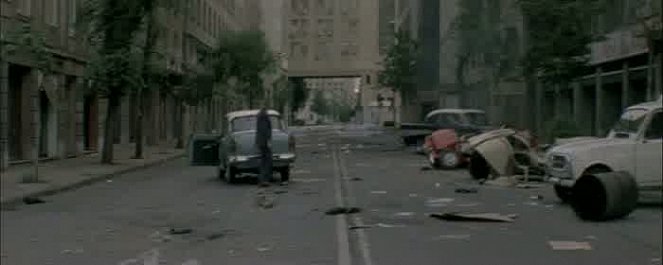Realização:
Pablo LarraínCâmara:
Sergio ArmstrongMúsica:
Juan Cristóbal MezaElenco:
Alfredo Castro, Antonia Zegers, Marcelo Alonso, Amparo Noguera, Jaime Vadell, Marcial Tagle, Aldo Parodi, Ernesto Malbran, Constanza B. MajlufConteúdos(1)
Santiago, 1973. Mario Cornejo trabalha na morgue, dactilografando os relatórios das autópsias efectuadas pelos médicos legistas. Durante os dias do golpe de estado militar, Mario envolve-se com uma dançarina do cabaré Bim Bam Bum. (Alambique Filmes)
Críticas (2)
O título «Amor nos Tempos de Cólera» teria sido mais apropriado para o filme do que para o romance com o mesmo nome. Um drama sombrio que ultrapassa a tristeza, mais próximo do fedor da morte. Larraín reduz ao mínimo o que pode, nem sequer se preocupando em montar a câmara para que os rostos dos atores possam ser vistos quando, numa cena estática de vários minutos, sentados calmamente à mesa da cozinha, começam a chorar e penduram a cabeça fora de cena. Estranhos personagens solitários, uma atmosfera sem vida, amor, humanidade e sol, um número crescente de cadáveres na morgue. Fora do apartamento do personagem principal, do hospital ou da morgue, temos um vislumbre raro, e mesmo isso acontece num ambiente teatralmente encenado. A última cena testa primeiro a paciência do espetador, apenas para finalmente o libertar e o ajudar a compreender o filme, e especialmente o significado da sua poética exaustiva. E deixa a ele a decisão de amaldiçoar ou reconhecer a sua abordagem sóbria.
()
The events of the bloody military coup, which overthrew the government of President Allende in September 1973, were important milestones in the Cold War. In my generation, the coup was common knowledge, albeit distorted through the lens of the Iron Curtain and the bipolar world. I fear that the majority of today's viewers will not be able to orient themselves in the story, especially considering that director Pablo Larraín does not make it any easier for them. He does not explain, nor analyze; we simply experience the coup subjectively through the peculiar pathologist, who silently and with a stony look on his face, observes the mounting piles of corpses on the floor, the groaning of the wounded, and the rising fear in people's eyes. We witness the examination of President Allende's body and the first isolated acts of resistance against the terror. Great histories are written on the streets and stadiums, while here, we rather clean up what is left of the old, shattered world. Mário is a man without expression or emotions, except for his fondness for a local theater dancer. He has no family or friends, no past, and no meaningful future. He is merely an inconspicuous observer of events that have exceeded even the darkest scenarios and imaginations. Overall impression: 75%.
()

